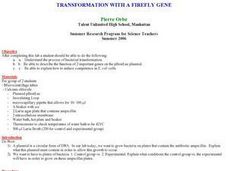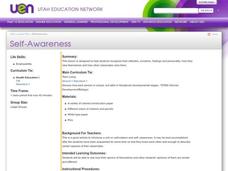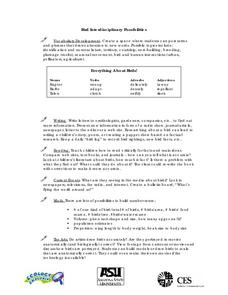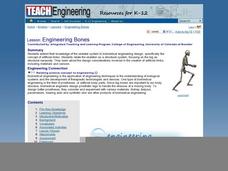Curated OER
Virus Tracker
Sixth graders will simulate the spread of a virus such as HIV through a population by "sharing" (but not drinking) the water in a plastic cup with several classmates. Although invisible, the water in a few of the cups will already be...
Curated OER
Transformation With A Firefly Gene
Learners understand the process of bacterial transformation through experimentation. They describe the function of two important genes of the pBestLuc plasmid. They explain how to induce competence in E. coli cells.
Curated OER
Walk a Mile in Albatross Shoes
Students recognize the correlation between the trash they dispose of around their school and the environmental hazards that face wildlife, specifically the Laysan albatross. They determine three ways that they can help the albatross chicks.
Curated OER
Different Types of Orange Juice Contain the Same Amounts of Vitamin C?
Students measure and compare the amount of vitamin C in orange juice samples. They discover the effects of different factors on the concentration of vitamin C. They participate in an experiment to test the orange juice.
Curated OER
What Is It?!
Working individually or in groups, 4th graders are presented with unusual or at least unfamiliar objects and are asked to speculate on what they are and/or how they are used. The intention is to get students to make careful observations...
Curated OER
Self-Awareness
Students investigate their attitudes, emotions, feelings and personality. They determine how they view themselves and how they are viewed by others.
Curated OER
The Value of a Garden
Students will work cooperatively. In this environmental lesson plan, students will start by discussing an article and its questions prior to receiving a handout. There are two versions of the handout depending if your students are AP or...
Curated OER
Bacterial Transformation
Students discuss a bacterial experiment they previously performed and complete a pre-assessment. They participate in a lecture discussion given by the teacher through PowerPoint and then complete a cartoon worksheet and post-assessment.
Curated OER
Ecosystem Services - Water Purification
Middle schoolers see that ecosystems provide services to people that are essential to life as we know it. Reporters (drops of water) could interview the trees and soil in the surrounding ecosystems for news stories on how they helped...
Curated OER
Water Purification
Students use the example of natural water purification to show that healthy ecosystems provide services to people that are essential to life as we know it.
Curated OER
DNA Fingerprinting
Students discuss methods used by forensic scientists and the basics of DNA and how it can be used to identify an individual after reading an article from The New York Times.
Curated OER
Bioethics
Students are introduced to the issues surrounding bioethics and begin to discover how some of these values can influence decision making. The exciting part of this lesson is the constructivist method used to engage students of all...
Curated OER
Where Am I, and How Do I Get Where I am Going?
Students describe geographical places through art, music, writing, and math. They compile information in booklets which may be published.
Curated OER
Urban Ecosystems 4: Metabolism of Urban Ecosystems
Cities are compared to living, breathing, metabolizing organisms. Fourth in a five-part series of lessons, this one focuses on the flow of materials through a city. Links to interesting websites and images make your delivery of...
Curated OER
Great Rivers 2: The Ups and Downs of River Flooding
Second in a three-part lesson on rivers, this lesson focuses on the flooding that occurs in riparian locations. First, learners take a look at facts about the Amazon River. They read online materials and fill in a worksheet as they...
Curated OER
Antibiotic Resistance
Students using the scientific method, study bacteria as a covering surface of the earth in many forms. They discover that not all bacteria is bad and introduce the topic of antibiotic resistance. Science Fair expectations are addressed.
Curated OER
Bird Interdisciplinary Possibilities
Students explore birds, their territory, breeding, and seasonal movement. They research and collect information on birds through writing letters to ornithologists, reading in books, comparing web sites, and observing pictures. Students...
Curated OER
What Can I Do?
Students discuss feelings and ways to deal with problems. In this conflict resolution lesson, students identify their feelings and learn ways to resolve conflicts with others.
Nuffield Foundation
Biodiversity in Your Backyard!
Take your enthusiastic ecologists outdoors to explore the biodiversity right in their own schoolyard! In preparing for this activity, it may be worthwhile to research websites with local flora to help in the plant identification portion.
Curated OER
Genes, Environments, and Behavior 2
Students explore the genetic and environmental factors that interact to produce variation in behavior across a population. They are introduced to the various approaches scientists use to explore this interaction. Students explore how...
Curated OER
Perception and Observation
Students use common and unusual objects to make observations of details, design, and functionality. They describe and draw each object while working in small groups. The differences between observation and perception is covered as part...
Curated OER
Engineering Bones
Students identify the features of a prosthetic limb and explain how engineers are involved in the prosthetic design. In this bone engineering lesson students describe the design criteria that goes into choosing the materials that go...
Teach Engineering
Complex Networks and Graphs
Show your class how engineers use graphs to understand large and complex systems. The resource provides the beginnings of graph theory by introducing the class to set theory, graphs, and degree distributions of a graph.
Curated OER
Bioethics: Tool for Portfolio and Performance Assessment
Students, in cooperative studying groups, assume the affirmative or negative position of a particular issue (premise). They research the issue and participate in a debate. In addition, they write essays to complete a portfolio entry.

























